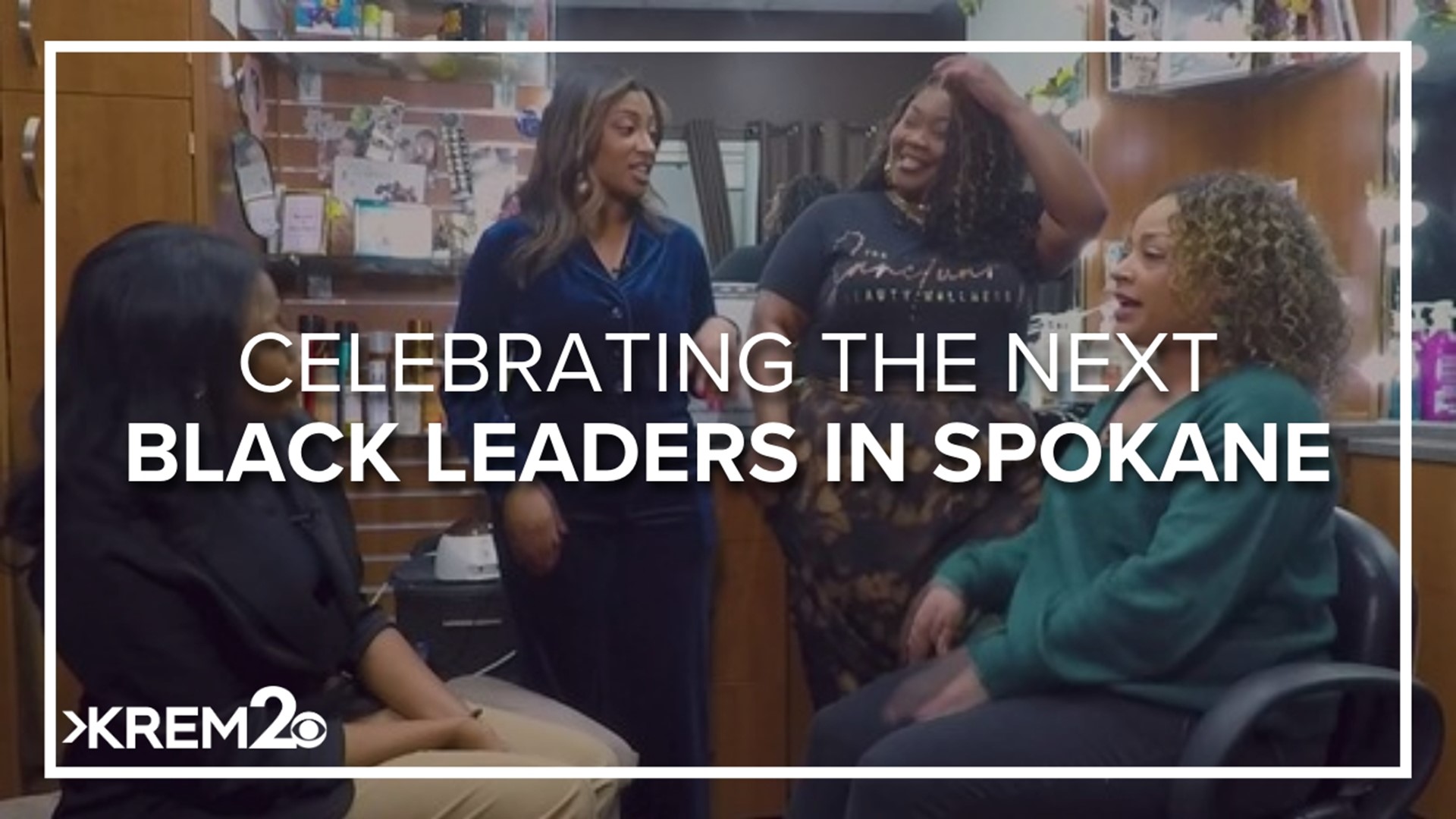SPOKANE, Wash. — When most people think of Black history, you think of the iconic figure-heads of the civil rights movement, like Martin Luther King Jr., Malcolm X and Rosa Parks. But Black history isn't just about the people who created change, it's also about Black culture in general. So I sat down with some of the next generation of Spokane Black leaders to have a conversation about Black History Month, in a place where Black culture is always celebrated... the hair salon.
Lisa Gardner is the new NAACP President in Spokane.
"We have so much that we take on throughout the day, throughout the weeks and out the months when we go to see our hair stylists, and they're doing what they're doing. It's magic," said Gardner.
Gardner, along with Natasha Hill, editor of The Black Lens, and Meme Williams, owner of The Sanctuary Beauty and Wellness, joined me for a conversation on Black history month at Meme's salon.
"I need this to be a safe space for us," said Williams. "I grew up in church, as well as the beauty salon."
Regardless of race, gender or background, most people can agree that going to see your hair stylist is a time to where you kick back and just be yourself.
"When you go to your hair stylist you can say whatever because she's not judging you," said Gardner.
But don't get it tangled or twisted, a lot of important conversations happen in the salon too.
"As we share Black culture, and we share Black joy, and we invite people in Spokane into our community to celebrate that with us, hopefully, they'll appreciate it and understand that this is something to really embrace the diversity as it grows here in Spokane," says Hill.
Probably more than anyone else in Spokane, Lisa Gardner knows just how important the Black hair salon is to the community.
"It's funny because my grandmother when she was alive, her beauty salon was on Sprague and back in the days Sprague was that seedy, kind of...it was the row," said Gardner.
Lisa's grandmother Sarah Gardner was a beautician and activist who ran for the Spokane City Council in 1987.
But two days after losing the primary, Sarah was found stabbed to death inside her salon. Lisa was just 12.
"I know that my grandmother groomed me," said Gardner. "I was with her at all of the NAACP meetings, city council meetings, church meetings. So I think that I was being groomed and didn't know that I was being groomed. So I think I'm just walking in the path that she laid before me."
With the loss of legends like Sarah Gardner, Carl Maxey, and Sandy Williams, a new generation is now taking the reins.
"We're starting to actually break ground and have our voices heard," said Gardner. "Before, it was something that was, we were kind of passive. And I think that we were, we were scared and we were passive because of the numbers, but we're not scared anymore, we're using our voices. Now we're going, we're taking these leadership roles, and we're making it so that other people can come behind us into these roles as well."
Like Natasha Hill, who grew up in Spokane and now is the editor of The Black Lens.
"I see endless possibilities for The Black Lens now that it's back and I want Black people in this community to see endless possibilities for themselves, for their families, for their children," said Hill.
Now, raising a family of her own, Hill is adamant that the next generation has more knowledge of who they are and where they come from.
"I think growing up here, especially being mixed race and growing up with white family, I had to really learn about Black culture.," said Hill. "You know, it wasn't just ever present around me, it wasn't directly in my family and I found myself usually the only Black girl in a lot of classrooms and a lot of spaces. So I wanted to learn about Black culture, I wanted to share that part of my identity."
Meme Williams is a relative newcomer to Spokane, but she's already making her mark on the city through her outreach in classrooms across the city.
"I recognize that in some of the spaces that I've been privileged to be in with enlightening our community with Black experiences, there are often people that identify as allies to us," said Williams. "And they do a really good job of not overstepping and taking up too much space, and just listening and we need that here."
A Tacoma native, Williams says it's important to her to make a path that others can follow in, and not gate keep her success.
"There's this idea that if there are more of us in a space that there's a problem and there can only be one," said Williams. "I get in a lot of these conversations around the beauty industry and even just with my coming up and like how much of a platform that I was put on. When I first got started, there was this idea that there is this, like, there's competition. And you can't be the only one. I don't want to be. There's plenty of room."
Three black women. Leading the way for generations to come.
"I think it's Black future month," said Gardner. "I mean, we keep hearing Black History Month, but I think that it'd be neat to look towards the future. We are the future here in this salon right here."
WATCH RELATED: Let's Talk: Honoring Spokane's Black History

